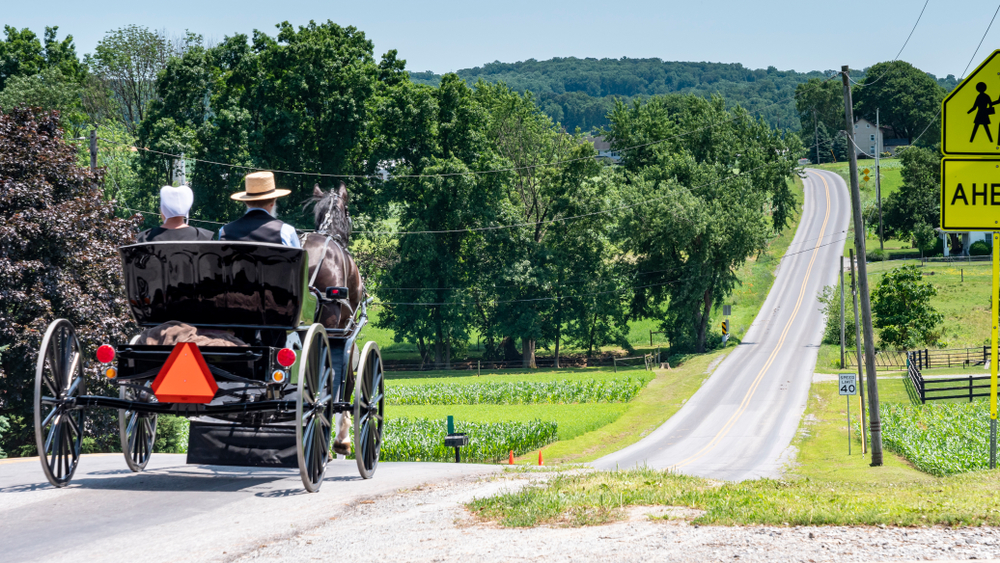
Quick! What’s the name of the group of Protestants that resemble Pilgrims and live simple, agrarian lifestyles in Pennsylvania and parts of New England? Did you say, “The Amish?” Perhaps you said “Quakers” or “Mennonites.” You might have even suggested “Shakers.” To outsiders, these words may seem to refer to the same religious communities. After all, these groups all originated as Protestant reformers who left Europe in search of spiritual alternatives. Here’s what you should know about these groups.
Mennonites
The Mennonites arose out of the Anabaptist movements that originated in Germany and the Netherlands (formerly Holland). Anabaptists are one of the Protestant groups that were formed during the Radical Reformation of the sixteenth century. Adherents consider baptism to be valid only when conducted with adults as a profession of their faith, as opposed to infant baptism or christening. Mennonites take their name from influential Dutch Anabaptist leader, Menno Simmons. There are over 2 million Mennonites located around the world today, with significant populations in the Americas, Africa, and Asia. Old Order Mennonites are practitioners of German and Swiss heritage that live mostly in Pennsylvania and embrace a simple, conservative lifestyle that rejects modern technology. Their estimated population is between 72,000 and 84,000.
The Amish
Similar to the Mennonites, the Amish are also a group of Anabaptist adherents with roots in Europe, namely Switzerland and France. The Amish are also known for living simple, rural lifestyles that embrace pacifism, plain dress, and manual labor over modern technology and conveniences. The Amish take their name from their founder, Jakob Ammann. Although they share roots and traditions with Mennonites, the Amish separated in the late 1600s and practice a more reclusive way of life. As Anabaptists, they only recognize adult baptism, although this may be offered to persons as young as 16. The Amish only marry other Amish members. Formal education goes up to the eighth grade in these communities. Today, there are over 360,000 members, located mostly in the United States and Canada. Besides Pennsylvania, significant settlements are located in Indiana, Ohio, Kentucky, Missouri, Michigan, New York, Wisconsin, Ontario, and Prince Edward Island.
Quakers
The word “Quakers” generally refers to members of a set of Protestant denominations that are collectively known as the Religious Society of Friends. Whereas Mennonites and Amish are Anabaptist religious movements, Quakers are generally guided by the belief that all humans can experience the light of God in others. Some sects even believe in the priesthood of all believers as inspired by the First Epistle of Peter. Quakers originally came from England. One of the most significant differences between Quakers and the Mennonites and Amish is in worship. Whereas the latter groups attend church services and have organizational hierarchies, Quakers generally don’t have ministers who lead congregations in worship. Most Quakers observe unprogrammed periods of worship. In other words, Quakers attend meetings where they worship silently without sermons, music, or other liturgical practices. From time to time, individual members may feel inspired to share a message with others. Quakers do not baptize or partake in Holy Communion. There are over 370,000 Quakers in the world, with almost half in Africa. While some Quakers do dress plainly, most wear modern clothing.
Some nontheist Quaker groups exist that don’t believe in God but embrace aspects of Quaker lifestyles. Shakers, originally known as Shaking Quakers, separated from the Quakers in England. Largely egalitarian, Shakers are known for having women leaders alongside men. As many as 2,000 to 4,000 Shakers lived in the United States during the nineteenth century, but only one Shaker village remains today in Maine.
While the words Mennonite, Amish, and Quaker may bring similar images to mind, it’s important to remember that these are different groups with different beliefs. They may share similar values in living simply and plainly, but they are different threads in the larger textile that is Protestant Christianity.

